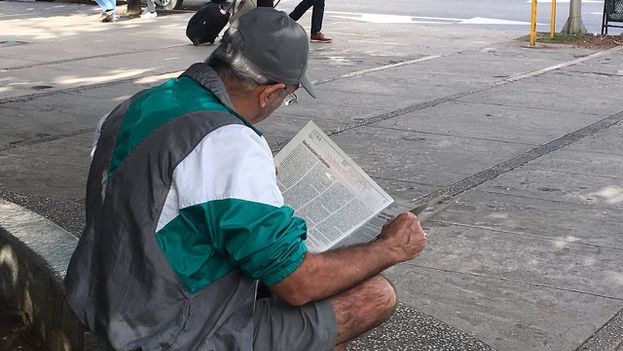
![]() 14ymedio, Reinaldo Escobar, Havana, 8 February 2017 – Now underway is the second meeting of young journalists at the Jose Marti International Journalism Institute in Havana. The main objective of the event, organized by the Cuban Journalists Union (UPEC), is to discuss “journalism and citizen participation, and communication in the context of updating Cuba’s social-economic model.”
14ymedio, Reinaldo Escobar, Havana, 8 February 2017 – Now underway is the second meeting of young journalists at the Jose Marti International Journalism Institute in Havana. The main objective of the event, organized by the Cuban Journalists Union (UPEC), is to discuss “journalism and citizen participation, and communication in the context of updating Cuba’s social-economic model.”
The news reports published in the official press, in addition to reviewing the 24 proposals from the previous meeting, held in December 2015, reiterate “the urgency of a change in the routines of production and a transformation of the management model.”
It is likely that the young participants of this experience will leave with the belief that national journalism is on the verge of change, and that they will have a role in its transformation. This would be the healthiest mistake of their professional career.
The vast majority of those in charge of deciding what can be published and what must be silenced know perfectly well how diffuse are the limits of their responsibility
Imbued with this useful error, they will return to their newsrooms convinced that the sacred verse of “changing everything that should be changed” will be applied to the mass media so that the press will finally fulfill its social role of keeping the population informed about what is really happening in the country.
The vast majority of those in charge of deciding what can be published and what must be silenced know perfectly well how diffuse are the limits of their responsibility. They know, for example, that they can berate the negligence of an administrator at a collection point where the bananas are rotting on a truck, but they can never criticize the evil effects of the excessive centralization of public administration.
When it comes time to choose, these leading cadres prefer to censor rather than declassify, because, as they know, no director of a newspaper or radio station ever been dismissed for silencing a criticism or hiding complaints in a drawer.
When these impetuous kids return to their media with a new shot of adrenaline, their more experienced colleagues will take the time to explain to them that since the 3rd UPEC Congress, held more than 40 years ago, it seemed that everything would change if they fulfilled the theme of that event: “For a critical, militant and creative journalism.”
Since then, there as been a lot of talk from the podiums about the culture of secrecy and the essential need to undertake rigorous analysis of the problems that afflict the population.
A brief inventory of recent information lacunae could justify a certain pessimism about the future of Cuba’s official journalism. The most notorious example is that no one has reported on the cause of death of ex-president Fidel, despite the fact that his passing is the news that has occupied the most space in the media since the end of last year.
No journalist has tried to explain in the official media why Marino Murilla, in the last session of parliament, did not not offer his traditional progress report with regards to the implementation of the Party guidelines, nor what has been the fate of the new electoral law that Raul Castro announced in February 2015 would be forthcoming, but about which nothing more has been heard.
Silence reigns over such important topics as the date when the country’s dual currency system will end, or when the United Nation’s human rights covenants will be ratified, or the depth of the dredging in Mariel Bay
Silence reigns over such important topics as the date when the country’s dual currency system will end, or when the United Nations human rights covenants will be ratified, or the depth of the dredging in Mariel Bay, just to mention a few topical issues.
If we go back a decade, it comes to mind that there have been no explanations about how the super-entity called the Battle of Ideas ended, which was led by Mr. Otto Rivero, of whom nothing more has ever been said. Nor is there any official report on the ouster of Carlos Venciaga, a member of the Council of State, nor about that of the army of social workers who had become omnipresent, but which are now nowhere to be seen.
Vice President Miguel Díaz-Canel spoke with reporters Monday afternoon and emphasized “the need to perfect” the work of the media. In passing, he called attention to ways to confront “the platforms of ideological political subversion,” which target young people. Curiously, among these platforms appear all of Cuba’s independent journalism, which finds among its principal niches all the information that is never talked about in the official press.
